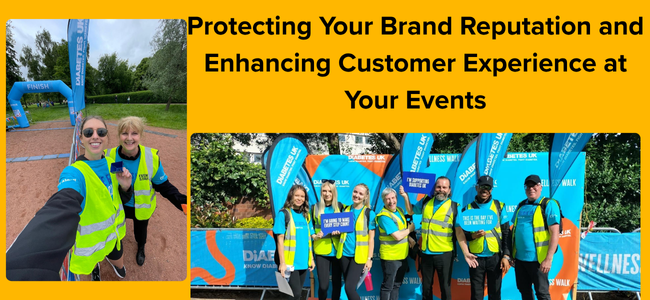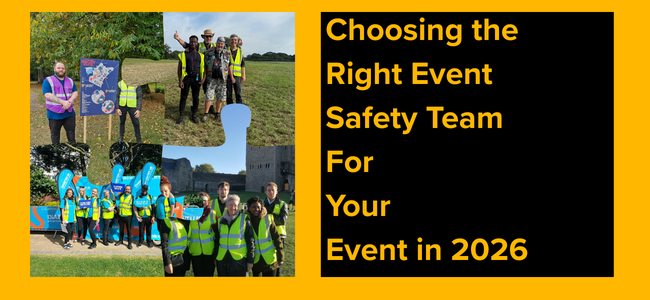The Difference Between Marshals, Stewards and Security Staff When planning an event, one of the…

Protecting Your Brand Reputation and Enhancing Customer Experience at Events
Protecting Your Brand Reputation and Enhancing Customer Experience at Events
When you host an event—whether it’s a product launch, conference, music festival, or corporate gathering—you’re doing more than just entertaining a crowd. You’re showcasing your brand in a very public, very tangible way. That means how people feel during and after your event has a direct impact on your brand’s reputation and how your customers perceive you.
Brand loyalty isn’t just built online or in-store anymore. Live events have become powerful touchpoints for creating emotional connections with your audience. But they also come with significant risk. One poorly managed incident—be it a long queue, a security lapse, or a lack of communication—can go viral and undo years of hard-earned goodwill.
In this article, we explore why customer experience and brand reputation are two sides of the same coin, and how to ensure both are protected when you run an event.
Why Reputation Matters More Than Ever
In the digital age, reputation can make or break a business. One bad review, poorly handled complaint, or video of a chaotic event scene can spread rapidly across social media platforms. Customers now expect more than just a good product or service—they want a seamless, safe, and engaging experience from start to finish.
If guests feel neglected, unsafe, or frustrated during your event, they’re likely to associate those negative feelings with your brand. On the other hand, a positive and memorable experience can lead to increased customer loyalty, stronger word-of-mouth marketing, and glowing online feedback.
Customer Experience: The Brand Builder
A well-orchestrated event can be a huge opportunity to elevate your brand. Every interaction—from registration to refreshments—shapes how people view you. Consider it like a live performance where every detail counts. Think of your attendees as brand ambassadors in the making.
Here are some key areas that influence customer experience:
First Impressions: Clear signage, friendly staff, and a smooth check-in process set the tone.
Comfort and Accessibility: Adequate seating, shade, restrooms, and clear pathways show your guests’ comfort matters.
Communication: Attendees should always know what’s happening and when—via apps, screens, or well-briefed stewards.
Inclusivity: Ensure your event is welcoming to all, including those with accessibility needs or dietary restrictions.
Safety and Security: A visible, reassuring presence of staff or marshals helps people feel protected without being policed.
Top Tips to Safeguard Your Brand and Delight Your Guests
Here’s a tried-and-tested list of top tips to help you manage brand reputation while delivering an excellent customer experience:
1. Plan With the Customer in Mind
Don’t just focus on logistics—map out the customer journey. From the moment someone hears about your event to the moment they leave, what do they see, hear, feel, and need?
2. Set Clear Expectations
Make sure guests know what to expect—venue details, schedules, dress code, what’s included, and what isn’t. This reduces frustration and boosts confidence in your event.
3. Train Your Staff
Anyone wearing your logo represents your brand. Staff should be courteous, informed, and empowered to handle issues on the spot. Provide them with FAQs and escalation procedures.
4. Create Share-Worthy Moments
Design elements of the event with social media in mind. Photo booths, branded backdrops, or unique giveaways can turn guests into brand advocates.
5. Listen and Adapt in Real Time
Use feedback mechanisms—like QR code surveys, comment cards, or roving staff—to catch problems before they escalate. A quick apology or fix can save a reputation.
6. Have a Contingency Plan
Expect the unexpected: bad weather, tech failures, traffic delays. A prepared response shows professionalism and protects trust in your brand.
The Role of Experienced Marshals in Event Success
One of the most overlooked yet crucial roles in safeguarding both your reputation and your attendees’ experience is that of marshals or stewards. These professionals are the friendly faces who manage crowds, guide traffic, enforce safety rules, and act as the first line of support when things go off-script.
Hiring experienced marshals adds a layer of reassurance—not just for your attendees, but for your team as well. They know how to:
De-escalate conflicts discreetly
Handle first-aid scenarios
Communicate calmly in high-pressure moments
Direct people efficiently in emergencies
Spot early signs of trouble before they become full-blown incidents
Marshals help create a sense of order and professionalism. Their presence signals to guests that your brand values their safety and is serious about quality. That contributes massively to the overall customer experience and leaves a lasting impression.
The Cost of Getting It Wrong
It’s worth remembering that reputation damage from a poorly executed event can be hard to repair. Whether it’s people complaining about a lack of water on a hot day, confusing directions, overcrowding, or aggressive security, these issues don’t just affect satisfaction on the day—they linger online.
According to industry surveys, nearly 80% of attendees say their opinion of a brand is influenced by event experience. Meanwhile, over 60% of unhappy customers say they would never return to a company after a negative event.
That’s why protecting your brand isn’t just a matter of marketing—it’s about operational excellence.
The Lasting Impact of a Well-Run Event
An event is your brand in real time. Everything from the welcome at the door to the exit signage shapes how people think and feel about your company. When it’s well-executed, the benefits are immense: customer loyalty, positive buzz, and a strong, credible image.
But if you overlook key details—like communication, safety, or staff behaviour—you risk undermining everything your brand stands for.
Investing in experienced marshals, proper training, thoughtful planning, and customer-first thinking ensures that your event enhances, rather than endangers, your reputation.
Reputation isn’t just what people say when you’re in the room—it’s what they post online when they leave your event. Make sure those posts are proud, not painful.


